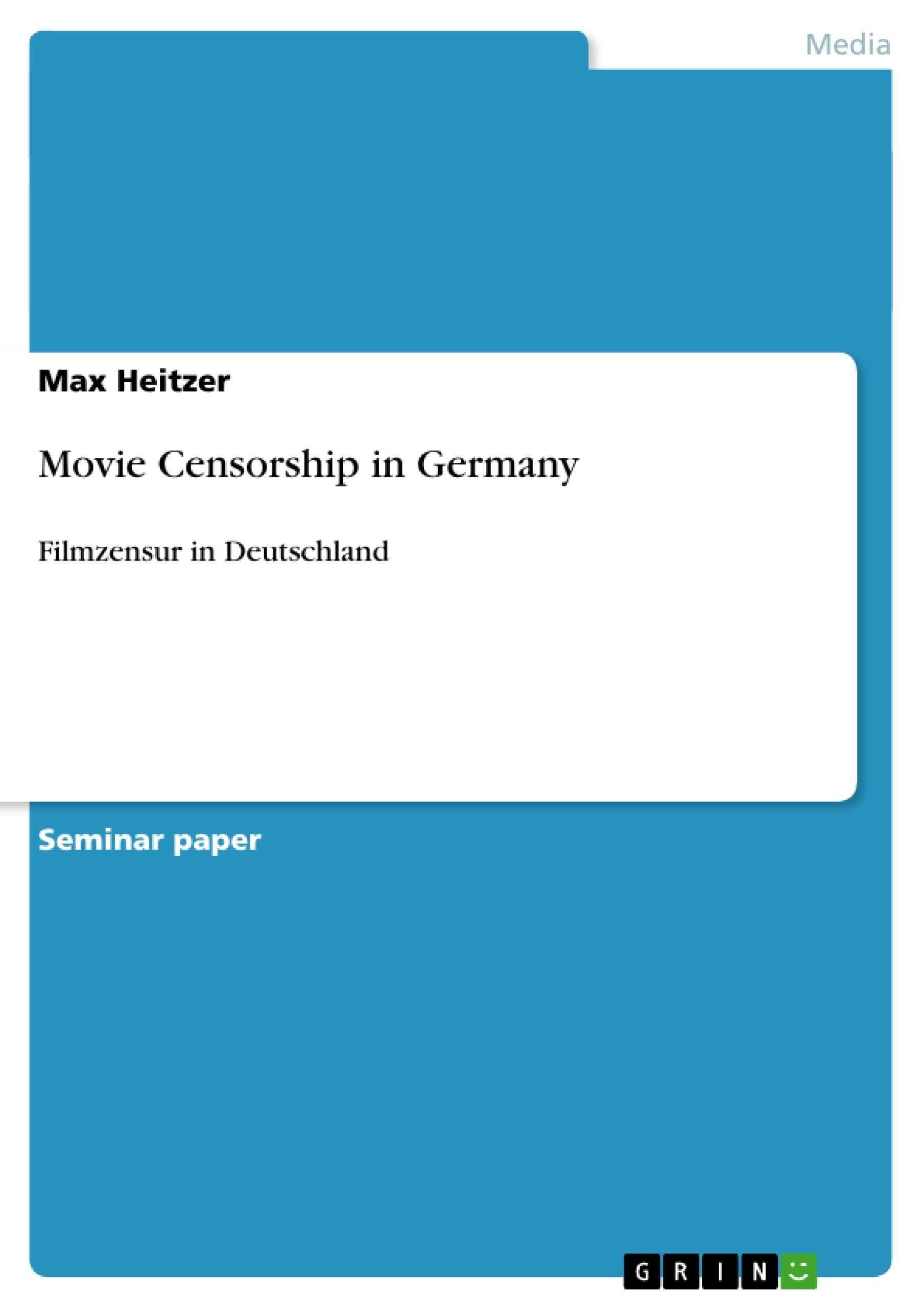Excerpt
1. Thesis
Although article 5 of the German constitution says that ”There shall be no censorship.“ and ”Art [...] shall be free.“ the reality looks different. Mainly movies and especially the horror genre often have problems with their aimed rating before they are published. In spite of an existing prohibition of censorship movies are cut down to be less harmful to youngsters and children although they are only suitable for adults anyway. But how does this procedure work? Which laws restrict the constitution and when are they applied?
After a short definition of the word censorship, an introduction of the most important institutions and a view of the general censorship situation in Germany this term paper shall make clear that:
Movie censorship is not necessary (in Germany).
2. Censorship
As already mentioned article 5 of the german constitution forbids censorship in Germany. Unfortunately this is a very difficult topic because you have to distinguish between art and crime. Why movies can be criminal although they are defined as art and when they cross the line is described in chapter 3.3.1.
2.1 A definition
The term censorship comes from the latin ‘censere’ and can be translated to ’to assess’. The original intention of censorship is the control of cultural content and distribution of press products, broadcasting, television and movies.1 Nowadays there are also guidelines for video games and internet publications.
German author and media scholar Roland Seim separates the term into pre-, post- and self-censorship. While pre-censorship is what is actually forbidden by the constitution, post-censorship is controlled by various companies in Germany which refer to different laws. Self-censorship basically means that authors, directors and artists already leave out critical material in their work to prevent censorship at a later time.2
2.2 History of movie censorship
Movie censorship as it is known today (for the protection of children and youngsters) began in the 1950s but reached its fever pitch in the 1980s with the introduction of video tapes. Thousands of movies, were not shown in the cinema and were released directly on tape, were the reason why the topic of controversial movies was mentioned for the first time. Video tapes were easy to copy and therefore uncontrollably distributed. Especially horror and ‘slasher’ movies have been popular for young children although they were only suitable for adults.3
In the mid-1980s the German law instructed an age based rating system for movies which was maintained until now. Since then the FSK (see chapter 3.1) controlled every cinematic product on every medium which was about to be released.4
3. Relevant companies for movie censorship
Before a movie can be published and sold in Germany it needs a rating. This rating is given by the Freiwillige Selbstkontrolle der Filmwirtschaft (Voluntary Self-Regulation of the Film Industry, FSK) or the Juristenkommision (Commission of Lawyers, JK) of the Spitzenorganisation der Filmwirtschaft (Head Organisation of the Film Industry, SPIO). Furthermore the Bundesprüfstelle für jugendgefährdende Medien (Federal Department for Media Harmful to Young Persons, BPjM) plays an important role as well.
3.1 FSK
The FSK is a voluntary organization for the protection of youth and minors. It controls the ratings for movies, series and trailers which are intended to be published in the Federal Republic of Germany. The FSK was founded in 1949 and is located in Wiesbaden, Hesse.
The work of the FSK is based on three clauses of chapter 3 in the Jugendschutzgesetz (Law for the Protection of Youth, JuSchG): Protection of young people in the context of media.5 These clauses are §11 ’Movie performances‘, §12 ’Data media with films or games‘ and §14 ’Labeling of films as well as of film and play programs‘.6
3.1.1 FSK ratings
Altogether there are five different ratings a film may be given:
Abbildung in dieser Leseprobe nicht enthalten 7
For this term paper only the ratings FSK 16 and FSK 18 are important because the focus will be on the horror genre.
16 to 18 year old people are expected to have a higher media literacy. Nevertheless movies which tend to glorify violence, discriminate particular groups or reduce sexuality to a mere instrument of gratification will not be approved.
Abbildung in dieser Leseprobe nicht enthalten
The value orientation of topics such as drug use, political radicalism and xenophobia are analyzed with sensitivity.
[...]
1 cf. Bertelsmann Universal Lexikon, 1991, p. 998
2 cf. Seim, Cut or Ban, 2003, www.f-lm.de/2003/01/01/cut-or-ban/
3 cf. Seim, Cut or Ban, 2003, www.f-lm.de/2003/01/01/cut-or-ban/
4 cf. Die Geschichte der FSK, www.fsk.de/index.asp?SeitID=16&TID=473
5 cf. Information about the FSK, www.fsk.de/index.asp?SeitID=1287&TID=480
6 cf. JuSchG, www.bundespruefstelle.de/bpjm/information-in-english.html
7 cf. Information about the FSK, www.fsk.de/index.asp?SeitID=1287&TID=480
- Quote paper
- Max Heitzer (Author), 2013, Movie Censorship in Germany, Munich, GRIN Verlag, https://www.grin.com/document/267528
Publish now - it's free






















Comments